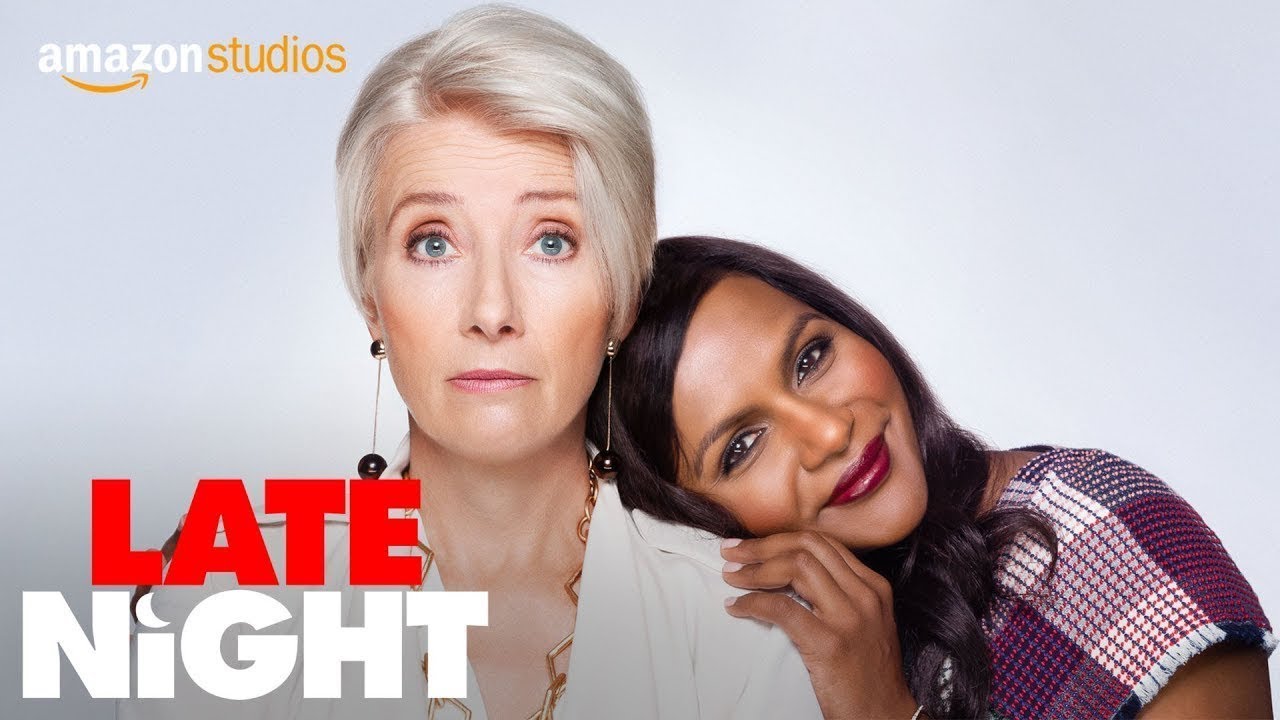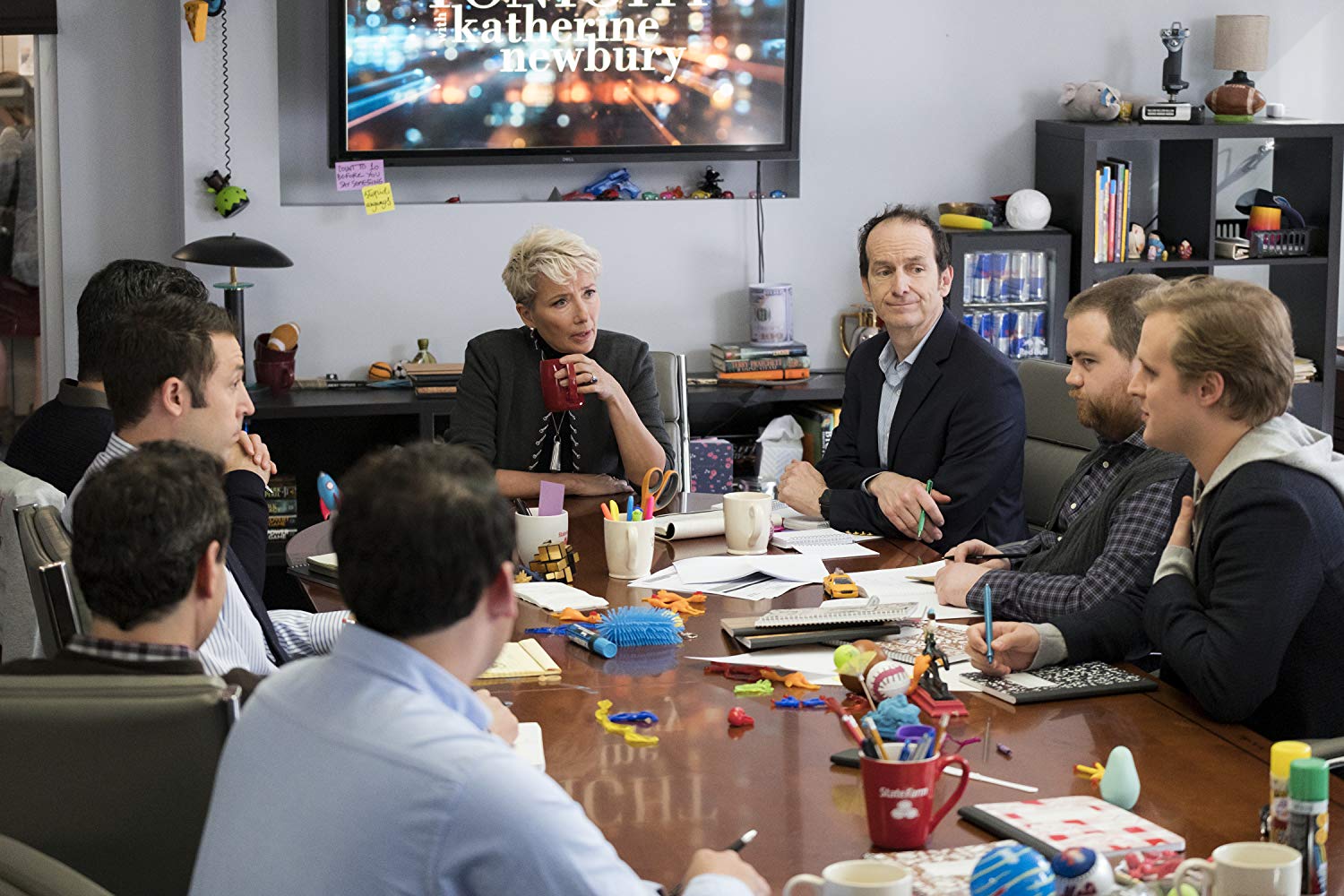If we look at Late Night under an X-ray machine, we’ll notice a very familiar skeleton. A predictable but inspiring feel-good film that we’ve seen a dozen times before. Replace Anne Hathaway and the fashion industry in The Devil Wears Prada with a brown girl working as a writer at a ‘Late Night’ show and it’s pretty much the same premise. But what happens when we look at the film through an MRI scanner and examine its organs and tissue? Now, we’ve got something wholly fresh. Not only that, we’ve also got one of the smartest and wittiest films of the year so far.
We follow an Indian-American (Mindy Kaling) who dreams more than anything else to work as a comedic writer for the ‘Late Night With Katherine Newbury (Emma Thompson)’ show. But instead of writing her as the usual Hollywood hustler who works part-time waiting tables and hits the open mics at night, Kaling (who’s also the screenwriter) pens Molly Patel as someone who works quality control at a chemical plant.
Every now and then she’ll test out new materials for her co-workers on the loudspeaker. She usually gets a laugh, which puts a smile on her face. She’s talented but that’s about all the “industry” experience that she has. And no, she doesn’t get her writing gig because a scout so happened to be walking around the chemical plant in which she works and discovers her talent; she gets in through sheer dumb luck.

She just so happens to apply for the job at a time when Katherine Newbury was nudged to add a female staff member to her writers’ room. When Molly walks into her interview and appears to be not just female but brown, her interviewer lights up — you can virtually hear the voice in his head go “ding ding ding! Perfect!” This makes Molly a complete outsider swimming into unchartered waters.
It also shows us that there’s no clear path to break into the media/arts industry. A lot of times, it’s just luck. What matters is what you do when you get there. In the film’s most riveting exchange, Molly accuses Katherine of hiring her for no other reason than the fact that she’s a brown woman — a “diversity hire.” To my surprise, Katherine says “you are a diversity hire. But the point is, you’re here.”
A simpler film with a less interesting writer would’ve penned the ‘Late Night’ talk show host as a man and the film’s central conflict ‘man vs woman.’ After all, from Jimmy Kimmel to Jimmy Fallon, Andy Cohen to Andy Ritcher, this field is unremarkably male-dominated. But by making the talk show host a highly talented, highly capable, highly regarded woman, the conflict becomes multi-layered. ‘Brown woman vs men vs white woman; women vs society; woman vs self.’ I use ‘vs’ lightly, the movie doesn’t present anyone as heroes and villains.
Why does an esteemed woman like Katherine Newbury only hire male staff writers? Why doesn’t she have any female friends? Perhaps it’s because she too was born and raised in an unfair and unjust patriarchal system that existed long before her time, so much so that it’s normalised. Even the men who look at Molly like she’s an alien from another planet on her first day of work (nobody offers her a chair, so she sits on a literal trash can) aren’t bad people. They’re simply not used to it. They too are cogs on a wheel that just keeps on spinning. I love that Late Night paints the system and not necessarily individuals as evil.
Most of the white men there frankly do not care that she’s a woman nor that she’s brown. They’re annoyed that she’s an inexperienced nobody hired on the basis of diversity. Which is fair. So Molly has to work twice as hard and prove that she’s twice as talented as anybody else in the room. But what the white men need to realise is that the very existence of the “diversity hire” concept proves that the system is skewed in favour of them and against minorities.
Katherine Newbury is a fascinating character with plenty of traits that can be seen as negative (some of them are, all of them are at least somewhat relatable). She’s a bit of an elitist who hates the idea of interviewing random social media influencers in the name of boosting ratings. I understand where she’s coming from. I would be pissed if someone told me to write puff pieces — ‘7 reasons sentences on why you’re dating the wrong guy’ — instead of analytical articles. But what do you do if you aren’t bringing in the numbers? What do you do if puff pieces guarantee dollars?
With the help of Molly and the rest of her writers, Katherine has to find a way to make her show feel current and interesting without sacrificing its identity. Katherine also has to realise that while she’s blaming the world for her losing battles, perhaps her biggest enemy lies within herself. Katherine Newbury is compelling as a character and Emma Thompson plays her to perfection. She’s on fire!
Sometimes a film tries to do too much and it becomes a mess, confused and unclear of what it’s trying to say. But here, the various threads and sociopolitical issues that are satirized are weaved into the film seamlessly. Take the multiple romantic subplots for instance. Two guys chase after Molly, first a charming nice guy with an ulterior motive, and later an asshole who’s perhaps more than meets the eye. These subplots are never in the forefront of the story, they’re written in a way that makes the workplace feel more lived-in and authentic. Characters don’t just do and say stuff for the sake of propelling the story forward, yet everything they do and say makes the narrative all the better, both emotionally and comedically.
There’s a subplot about Katherine Newbury and her husband, in which the seeds are planted quickly and covertly very early in the movie. Even this offers an interesting take on workplace sexual relations between an employer and an employee. It also brings about a heartbreaking acting moment from Thompson.
Mindy Kaling and director Nisha Ganatra explore all of it in a nuanced and hilarious fashion and still find a way to make the president of a TV network (played by Amy Ryan) — a character who’s threatening to cancel our protagonist’s show, a character who consumers of art conventionally see as “villains” of the industry — come off as someone who’s level headed and makes complete sense.
Mindy Kaling has said that Late Night was written based on her real-life experiences. It’s easy to see that considering how earnest the film feels. Late Night is absolutely brilliant. It’s incredibly smart, heartwarming and is filled with three-dimensional characters (and magnificent performances by Kaling and Thompson) that will be remembered long after the final credits have rolled. But I also cannot understate just how funny it is. It’s been a while since I laughed so much and so hard it hurt my belly. Late Night is one of the funniest films in recent memory and undoubtedly one of the best of 2019.
Follow us on Instagram, Facebook, Twitter or Telegram for more updates and breaking news.





